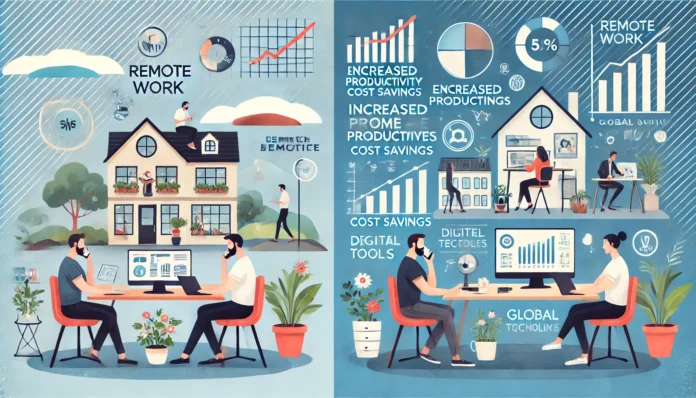The rise of remote work has transformed the modern workplace, offering new opportunities and challenges for both companies and employees. What started as a temporary solution during the COVID-19 pandemic has evolved into a permanent fixture for many organizations across the globe. As more businesses embrace remote work, it’s becoming clear that this shift offers significant benefits on both sides. Here, we explore the key advantages that remote work provides for both companies and employees.
Benefits for Companies
1. Increased Productivity
Contrary to early skepticism, remote work often leads to higher productivity. Without the distractions of a busy office, employees can focus on their tasks, leading to more efficient work. A 2020 study by Prodo score found that remote work increased productivity by 47%. This boost can be attributed to fewer interruptions, less time commuting, and the flexibility to work during peak productivity hours.
2. Cost Savings
Companies that embrace remote work can significantly reduce their operational costs. With fewer employees in the office, businesses can downsize their office spaces, saving on rent, utilities, office supplies, and even amenities like coffee and snacks. Additionally, remote work can lower turnover rates and reduce recruitment and training costs by improving employee satisfaction and retention.
3. Access to a Global Talent Pool
By offering remote work, companies are no longer limited to hiring talent within a specific geographic region. This opens the door to a global talent pool, allowing businesses to find highly skilled employees from around the world. This can be especially beneficial for companies in tech, marketing, or creative industries, where specific expertise is often needed.
4. Business Continuity
Remote work enables businesses to maintain operations even during unforeseen disruptions, such as natural disasters, public health crises, or political unrest. With employees already equipped to work remotely, companies are more resilient and better prepared to adapt to unexpected circumstances, ensuring continuity without significant interruptions.
5. Environmental Impact
Remote work contributes to a more sustainable future by reducing the need for commuting, which in turn decreases carbon emissions. By shrinking their office footprint, companies can also lower their energy consumption. For organizations focused on reducing their environmental impact, remote work offers an easy way to contribute to a greener planet.
Benefits for Employees
1. Better Work-Life Balance
One of the most significant advantages of remote work for employees is the improved work-life balance. Without long commutes and rigid office hours, employees have more time to spend with family, pursue hobbies, or focus on personal well-being. The flexibility to structure their day as needed leads to less stress and increased job satisfaction.
2. Increased Autonomy and Flexibility
Remote work gives employees the flexibility to tailor their work environments to their needs. Whether it’s setting up a quiet home office, working from a café, or traveling to new locations while working, remote work provides greater autonomy. Employees can also choose the hours when they are most productive, which can lead to more effective and efficient work.
3. Cost Savings for Employees
Just as companies save on operational costs, employees also benefit financially from remote work. Without commuting expenses, such as gas, parking, or public transportation, employees can save a significant amount of money. Additionally, they may save on other expenses like work attire, lunches, and childcare.
4. Reduced Commute Stress
Commuting to and from work can be time-consuming, stressful, and costly. According to the U.S. Census Bureau, the average American spends about 27.6 minutes commuting one way to work. Remote work eliminates the need for commuting, giving employees more time for themselves and reducing the stress and exhaustion that often come with daily travel.
5. Improved Health and Well-Being
Remote work can have a positive impact on employees’ physical and mental health. With the flexibility to manage their own schedules, employees can take breaks, exercise, and cook healthier meals. The reduction in stress from avoiding daily commutes and workplace pressures also contributes to better mental health. A study by the American Psychological Association found that remote workers experienced lower stress levels and better overall well-being.
Addressing Challenges in Remote Work
While the benefits of remote work are clear, it’s not without its challenges. Some employees may struggle with isolation or lack of face-to-face interaction, while companies may find it difficult to maintain a cohesive team culture. To mitigate these challenges, businesses should:
– Invest in digital collaboration tools, such as Zoom, Slack, and project management platforms like Asana or Trello.
– Encourage regular communication through video calls, check-ins, and team meetings to maintain a sense of connection.
– Offer flexibility within structured guidelines to ensure employees remain productive without feeling micromanaged.
– Foster a culture of trust by focusing on results and output rather than time spent online or in meetings.
The Future of Remote Work
As companies and employees become more accustomed to remote work, it’s clear that this trend is here to stay. While some organizations may adopt hybrid work models that combine remote and in-office work, others will continue to operate fully remotely. The key to success lies in flexibility, communication, and a mutual understanding of the benefits that remote work offers both sides.
For businesses, remote work means greater access to talent, cost savings, and a more resilient operation. For employees, it provides an opportunity to create a more fulfilling work-life balance, reduce stress, and enjoy increased autonomy. As the world continues to evolve, remote work will undoubtedly play a significant role in shaping the future of work.















